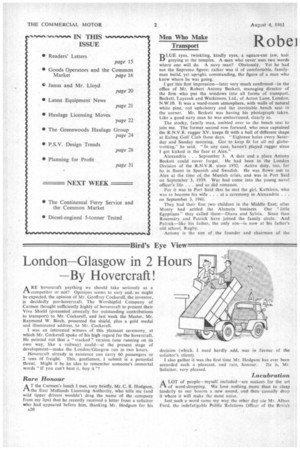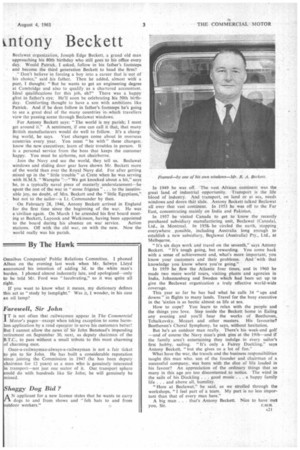Robe]
Page 22

Page 23

If you've noticed an error in this article please click here to report it so we can fix it.
fftony Beckett
D LUE eyes. twinkling, kindly eyes, a square-cut jaw, hair
greying at the temples. A man who never uses two words where one will do. A navy man? Obviously. Yet he had not the Supremo figure; rather was it of comfortable, familyman build, yet upright, commanding, the figure of a man who knew where he was going.
I got this first impression—later very much confirmed—in the office of Mr_ Robert Antony Beckett, managing director of the firm who put the windows into all forms of transport, Beckett, Laycock and Watkinson, Ltd., of Acton Lane, London, N.W.I0. It was a ward-room atmosphere, with walls of natural white pine, red upholstery and the inevitable bench seat in the corner. Mr. Beckett was having his photograph taken. Like a good navy man he was embarrassed, clearly so.
The stodky, family man, ambled over to the bench seat to join me. The former second row, forward, who once captained the R.N.V.R. rugger XV, keeps fit with a ball of different shape at Ealing Golf Club these days. "Eighteen holes every Saturday and Sunday morning. Got to keep fit for all mji globetrotting," he said. "In any case, haven't played rugger since I got kicked in the face at Alex."
Alexandria . . . September 3. A date and a place Antony Beckett could never forget. He had been in the London Division of the R.N.V.R. since 1932. Active duty, too, for he is fluent in Spanish and Swedish. He was flown out to Alex at the time of the Munich crisis, and was in Port Said on September 3, 1939. War had come into the young naval officer's life . . and so did romance.
For it was in Port Said that he met the girl, Kathleen, who was to become his wife . . at a ceremony in Alexandria . . . on September 3. 1941.
They had their first two children in the Middle East; after Monty had settled the Alamein business. Our "little Egyptians" they called them—Diana and Sylvia. Since then Rosemary and Patrick have joined the family circle. And Patrick—like his father, the only son—is now at his father's old school. Rugby.
Antony is the son of the founder and chairman of the Beclawat organization, Joseph Edge Beckett. a grand old man approaching his 80th birthday who still goes to his office every day. Would Patrick, I asked, follow in his father's footsteps and become the third generation Beckett to head the firm?
." Don't believe in forcing a boy into a career that is not of his choice," said his father. Then he added, almost with a purr, I thought: "But he wants to get an engineering degree at Cambridge and also to qualify as a chartered accountant. Ideal qualifications for this job, eh?" There was a happy glint in father's eye. He'll soon be celebrating his 50th birthday. Comforting thought to have a son with ambitions like Patrick. And if he does follow in father's footsteps he's going to see a great deal of the many countries in-which travellers view the passing scene through Beclawat windows, For Antony Beckett says: "The world is my parish; I must get around it." A sentiment, if one can call it that, that many British manufacturers would do well to follow. It's a chang
ing world, he says. Vast changes come about in overseas countries every year. You must "be with" these changes; know the new executives; learn of their troubles in person. It is a personal service from the boss that keeps the customer happy. You must be airborne, not chairborne.
Join the Navy and see the world, they tell us. Beclawat windows and sliding door gear have shown Mr. Beckett more of the world than ever the Royal Navy did. For after getting mixed up in the " little trouble" at Crete when he was serving with H.M.S. "Warspite "—" We got knocked about a bit," says he, in a typically naval piece of masterly understatement—he spent the rest of the war in "stone frigates" , . to the inestimable joy, no doubt, of Mrs. Beckett and the "little Egyptians," but not to the sailor—a Lt. Commander by then.
On February 28, 1946, Antony Beckett arrived in England for the first time since the beginning of the war. He was a 'civilian again. On March 1 he attended his first board meeting at Beckett, Laycock and Watkinson, having been appointed to the board during his absence on war service. Action stations. Off with the old war, on with the new. Now the world really was his parish.
In 1949 he was off. The vast African continent was the great land of industrial opportunity. Transport is the life blood of industry. And transport, on land or at sea, needs windows and doors that slide. Antony Beckett talked Beclawat all over that vast continent. In 1953 he was off to the Far East, concentrating mainly on India and Pakistan.
In 1957 he visited Canada to get to know the recently purchased subsidiary manufacturing unit, Bcelawat (Canada), Ltd., in Montreal, In 1958. he circled the earth, stopping everywhere possible, including Australia long enough to establish a new subsidiary, Beilawat (Australia) Pty., Ltd., at Melbourne. .
"It's six days work and travel on the seventh," says Antony Beckett. "It's tough going, but rewarding. You come back with a sense of achievement and, what's more important, you know your customers and their problems: And with that knowledge you know where you're going."
In 1959 he flew the Atlantic four times, and in 1960 he made two more world tours, visiting plants and agencies in India, Johannesburg and Sweden which had been set up to give the Beclawat organization a truly effective world-wide coverage.
This year so far he has had what he calls 34 "ups and downs" in flights to many lands. Travel for the busy executive in the 'sixties is as hectic almost as life at sea.
How to cope? You learn to relax with the people and the things you love. Step inside the Beckett home in Ealing any evening and you'll hear the works of Beethoven, Tchaikovsky. Mozart and other masters. His favourite? Beethoven's Choral Symphony, he says, without hesitation.
But he's an outdoor man really. There's his week-end golf —and of course the Navy man's pink gins at the 19th—and if the family aren't entertaining they indulge in every sailor's first hobby, sailing. "It's only a Fairey Duckling," says Antony Beckett, "but she gives us a lot of fun."
What have the war, the travels and the business responsibilities taught this man who. son of the founder and chairman of a successful company, was born with the dice of life loaded in his favour? An appreciation of the ordinary things that so many in this age are too discontented to notice. The wind in the sails of his Duckling . . good music . . . a happy family life . . . and above all, humility.
"Here at Beclawat," he said, as we strolled through the workshops, "I feel part of a team. My part is no less important than that of every man here."








































































































